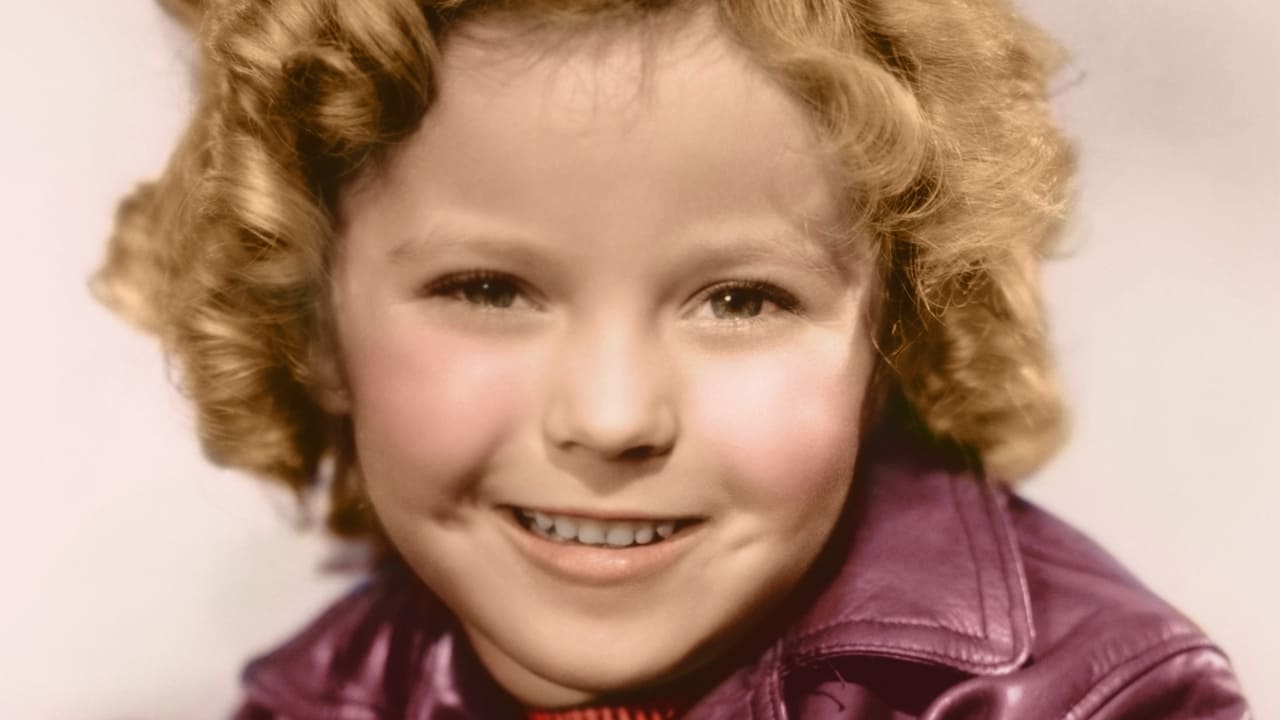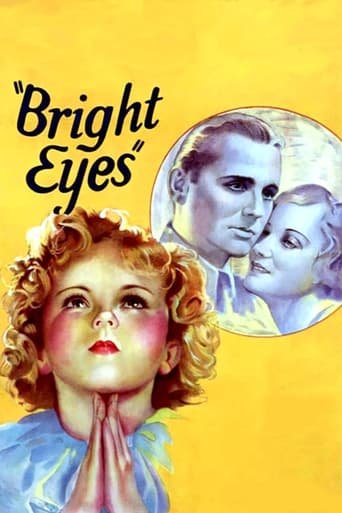

Shirley Blake (Shirley Temple) lost her pilot father in a crash. She likes to hang out at the airport with her godfather Loop Merritt and all of their friends. Her mother Mary is a live-in maid working for the Smythes. Mrs. Smythe disapproves of her flyboy friends and plans to fire her after Christmas. The family hates cranky uncle Ned Smith but Mr. Smythe hopes to get the inheritance. The only person Ned likes is Shirley whom he calls Bright Eyes. Mary is killed by a car and Ned wants to adopt Shirley. This sets up a legal battle for the little girl between the Smythes and Loop.This has the super cute and spunky Shirley Temple who delivers the song On the Good Ship Lollipop. She's a million watts light bulb. The rest of them are perfectly fine although the other girl Joy is awkwardly bratty. In the end, the battle is between two people who both love Shirley and there is limited drama in the lack of danger. That may be why a dangerous situation had to be manufactured.
... View MoreMy review title contains a quote from Shirley, in response to pilot Loop questioning if she's OK. As the only passengers in Loop's small plane caught in a violent thunderstorm, Loop eventually decided they that he and stowaway Shirley must do a parachute jump with just his one chute(why?). They did so, with a hard landing in an open area on a mountain. Unfortunately, the violent wind then pulled the still-attached parachute toward a very high cliff, dragging them along, until Loop finally gets the harness free just before they are to be pulled over the cliff... Before this incident, Loop had taken little Shirley, with aspirations of becoming a pilot, high up in his plane, supposedly close to heaven, telling her that her mother was so lonely for her crash-killed father that she decided to join him in heaven. "You mean she cracked up, too" Shirley responded: one of the tear-jerking moments in the film....In another scene inside a plane, on the ground, she sings her classic "On the Good Ship Lollipop". The plot reflects Shirley's real life ambition to become a pilot. But at that time, she wasn't allowed in a flying plane, for insurance reasons.It's my contention that Shirley's core films represented, in large part, a talkie female equivalent of the silent Little Tramp. Like Chaplin's Tramp, she was in some ways child -like and in some ways adult-like, cast as being an isolated entity, usually in an unstable, marginal, family relationship, through no fault of her own. Unlike most families with children of the time, she was always cast as an only child and, in most films, interacted mostly or exclusively with adults: very different from the case in the contemporary "Our Gang" series. But, in contrast to the stereotypical spoiled bratty only child represented in the extreme by Jane Wither's character(Joy) in the present film, she was characterized as most valuing loving associations with adults who were unattached with other adults, seemingly lonely, but who found in her a kindred spirit, which brought to the surface a loving, caring, person.In this film, Shirley identifies with old Uncle Ned, and he with her, despite he being generally grouchy, demanding, and wheelchair-bound. , because they are both forced to live in this household as outsiders of the nuclear family(Smythes), not loved by any of its members(especially Joy). Ultimately, this relationship appears to work out for the benefit of both. But , there is the important complicating factor of flier Loop(James Dunn), who is her best friend, godfather, and surrogate father, having been the best friend of her deceased father. He also insists that he can take care of Shirley, with the sudden death her mother on Christmas day. Thus, we have a court battle between Uncle Ned and Loop over which, if either, will become Shirley's legal guardian. Shirley is very lucky that the judge decides to make her desire paramount in his decision. In choosing Loop, plus his estranged girlfriend, plus Uncle Ned, she, along with the judge, apparently solve the problem, by declaring that the 3 live together with Shirley, leaving the arrogant, mean, greedy Smythes holding the bag(cut out of Uncle Ned's inheritance. It's wonder they hadn't poisoned him by now!). Unfortunately, given the animosity recently shown between Loop and Uncle Ned, and between Loop and his estranged girlfriend, this arrangement realistically looks awfully forced, perhaps likely to fragment soon. But, it might work, given Shirley's glue.Jane Withers, as the Smythe's seemingly psychopathic daughter, ironically named Joy, gives a riveting portrayal, for the times, of a spoiled brat of a well-to-do family. Clearly, Joy enjoys cruelty and negativity, as evidenced by the bossy treatment of much smaller Shirley, her dismemberment of her former doll, which Shirley found in the trash, a penchant for imagining she is killing people with a machine gun(her requested Christmas present), her constant spanking of her dolls, and her purposeful irritating of Uncle Ned. True, these behaviors aren't that unusual in this culture for boys, but not girls. she immediately throws away or breaks her Christmas gifts, claiming she only wanted a wheelchair like Uncle Ned's(presumably so others would treat her with more kindness, and as a very unexpected novelty)...At one point, Shirley turns the tables on Joy, when the later tries to wreck Shirley's baby carriage, with a vigorous side collision with her own carriage. But, Shirley pulls her carriage out of the line of fire at the last moment, causing Joy's carriage to smash into a stone wall, sending her and her carriage sprawling. This has to be the most satisfying moment in the film!. Of course, Joy claimed that Shirley(much smaller) pushed her down. The second most satisfying moment is the ending.Reportedly, screenwriter and director David Butler got the idea for Shirley and her mother living in the home of their employer from his own experience as a child. This was the first of 4 Shirley-starring films that Butler directed. In a directing career that spanned more than 40 years, It's not surprising to learn that he directed TV's "Leave it to Beaver". While at Warner, he also directed some of Bob Hope's classic comedies, and some of Doris Day's early musicals.This was the last of 3 films featuring Shirley, in which James Dunn played her surrogate or actual father. While lacking the physical charisma of some of her later male leads, obviously he had great rapport with Shirley, with modest musical and comedic talent(check out "Baby Take a Bow"). Unfortunately, with the merger of Fox and Twentieth Century in 1935, he was reassigned, and a few years later developed a chronic drinking problem.
... View MoreThis is the third Shirley Temple film, that I also enjoy watching during the Christmas season. Again it is not a Christmas story, but it does takes place at Christmas. This film is also a perfect example of the sweet, kind, and adorable curly-topped little girl, that endeared Shirley Temple to the Depression-era audiences of the 1930s. She sings her famous trademark song " On The Good Ship Lollipop " in Bright Eyes, and deals with the snobby, spoiled brat character, that Jane Withers plays so convincingly. Shirley Temple would never be upstaged again by another child in any of her other films. Another scene stealer in this movie, is Charles Sellon, who is wonderful to watch as the cranky Uncle Ned Smith, who softens so sweetly towards Shirley. A very tender scene takes place Christmas eve, when Shirley says her prayers with her mother, and she hangs the longest stocking on her bedpost. Christmas morning, the happy child excitedly tells Mrs. Higgins ( Jane Darwell ) the housekeeper what Santa Claus brought her, meanwhile bratty Jane is seen tearing through her presents. James Dunn has a prominent and important part in this story, and it's always a delight to watch his scenes with Temple. Unfortunately, in this story the mother is struck by a car and killed, which maybe a difficult moment for little children to understand. But as in all Shirley Temple films, a happy ending always prevails. Bright Eyes is one of those endearing stories, that continues to deliver pure entertainment.
... View More119: Bright Eyes (1934) - released 12/11/1934, viewed 9/22/08.BIRTHS: Judi Dench.DOUG: It appears I had completely misunderstood Shirley Temple's niche in Hollywood before I watched this movie. I thought that her movies were all-out musicals for kids only, but she was more for the family and all-ages market. Bright Eyes is not a kids' movie, nor is it really a musical, other than the famous Good Ship Lollipop number. That number is, I think, more indicative of a trend in the early sound period where nearly every movie made tried to incorporate a scene with music. I thought the movie was going to be predictable, and it mostly is; the Smythe family never really become more than one-dimensional caricatures, ready to toss the lovely Shirley out onto the street while still indulging their own demonic daughter's every whim. Still, it managed to surprise me in a few places. Loop and Uncle Ned, the two most awesome characters and the ones who care about Shirley the most, suddenly become enemies as they each try to claim custody. **SPOILER ALERT** I was almost in tears a couple times: when Shirley's mom dies was pretty rough (though that car hit looked awfully gentle), and Loop flying through the storm is pretty intense. **END SPOILER** If you're trying to get an idea of what Shirley Temple was all about in Depression-era Hollywood, Bright Eyes is a great place to start. Contract Player Alert: Charles Sellon (Uncle Ned) and Jane Withers (Joy) both appeared three films ago in It's a Gift, as Mr. Muckle and the hopscotch girl, respectively. KEVIN: This movie surprised me. I really didn't expect to like it much, but the themes of the film and the complexity of many of the characters kept me interested. Of course little Shirley is great, everyone knows that, but all the adult characters, none of whom I recognized right off, are all very well acted and fully fleshed out. **SPOILER ALERT** I'm not gonna lie, I was indeed moved to tears in the scene where Loop (James Dunn) must tell little Shirley that her Mom has died. **END SPOILER** And I was even more intrigued when Shirley is taken in by the snobbish, blue-blooded Smythe couple with their bratty, Nazi-in-training daughter (Jane Withers). Although the custody battle between Loop and the Smythes is the center of the movie, the film does a really good job setting up the characters and getting all its ducks in a row for maximum emotional punch. I couldn't help but giggle at the schmaltzy happy ending, starting with the judge deciding that the proceedings "won't need lawyers anymore." Everyone gets what they want and/or what they deserve, even the crotchety uncle.Last film: The Man Who Knew Too Much (1934). Next film: The Scarlet Pimpernel (1934).
... View More